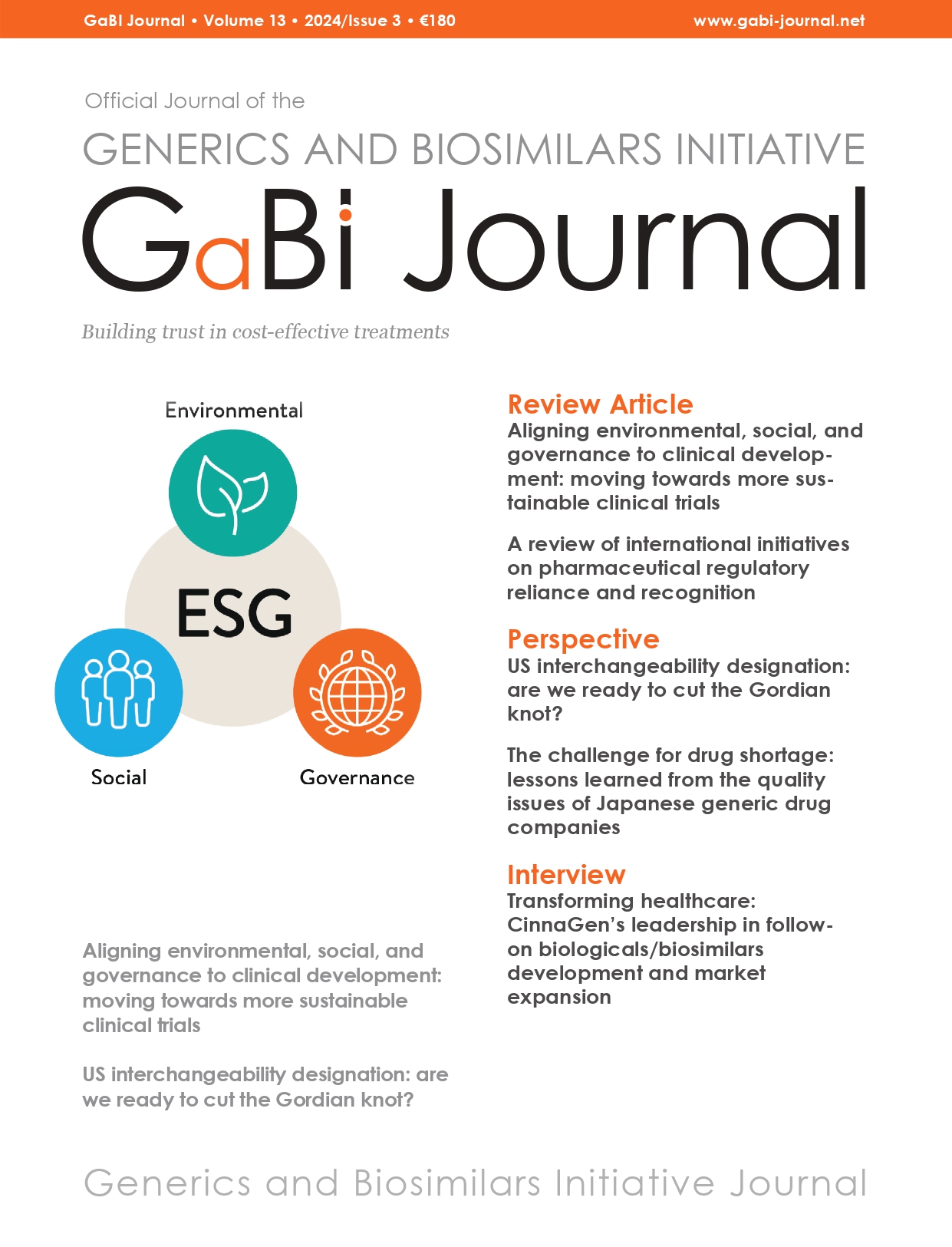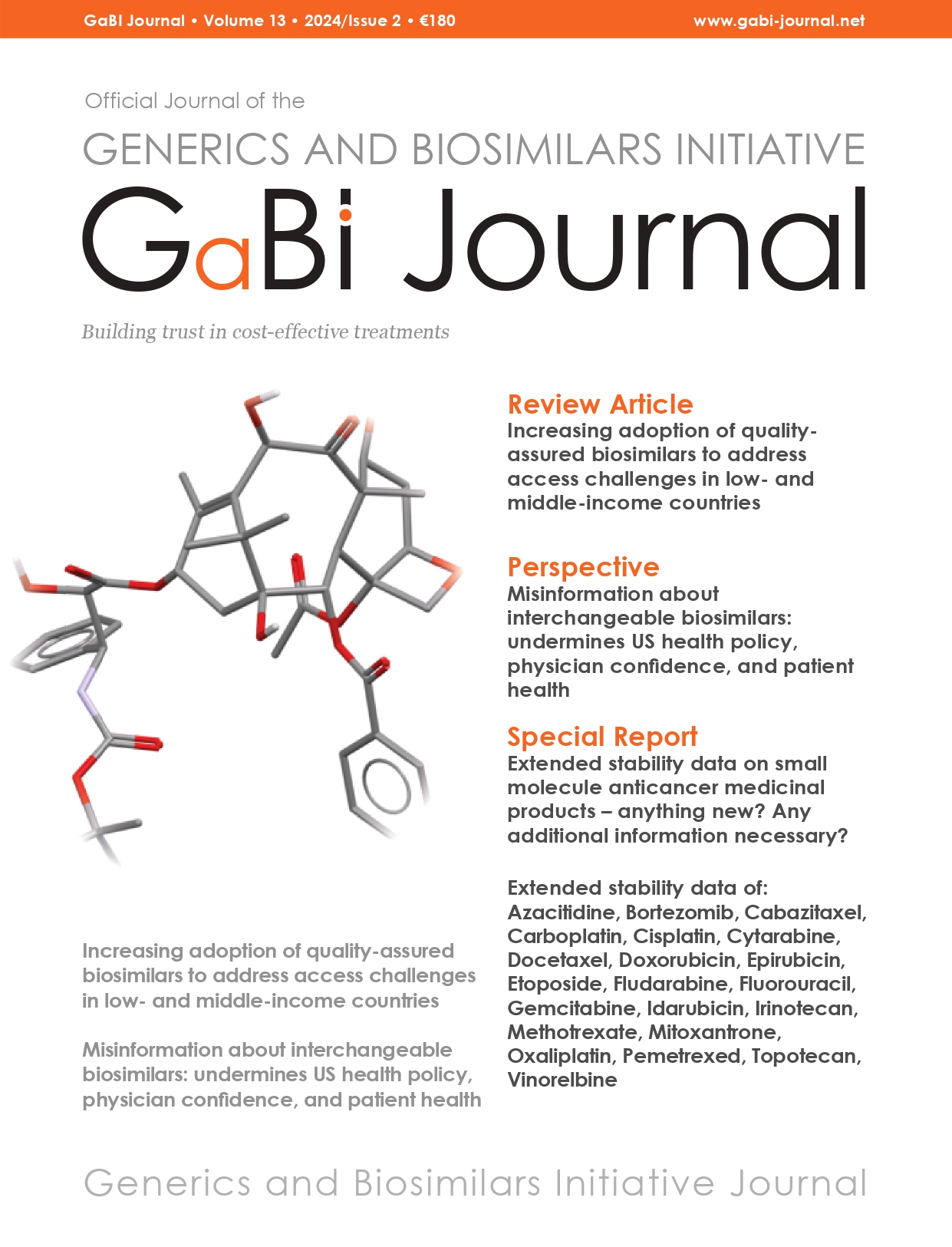Interchangeability of biosimilars in the US and around the world
Published on 2017/05/08
Generics and Biosimilars Initiative Journal (GaBI Journal). 2017;6(2):97-8.
|
Abstract: |
Submitted: 6 April 2017; Revised: 14 April 2017; Accepted: 14 April 2017; Published online first: 28 April 2017
There is a lack of harmonization around the world when it comes to how different countries or regions approach interchangeability of biosimilars [1].
USA
In the US interchangeability is defined in law as part of the Biologics Price Competition and Innovation Act of 2009 (BPCI Act) as:
‘the biological product may be substituted for the reference product without the intervention of the healthcare provider who prescribed the reference product’.
The US Food and Drug Administration (FDA) may approve a product as interchangeable, see Table 1, although individual states control the act of pharmacy-level substitution. The agency issued draft guidance on biosimilar interchangeability in January 2017 [2] and more recently extended the comment period on the guidance [3]. Twenty-five US states have passed legislation addressing biosimilar substitution [4].
European Union
The European Commission has defined interchangeability in a consensus information document on biosimilars [5] as:
‘the medical practice of changing one medicine for another that is expected to achieve the same clinical effect in a given clinical setting and in any patient on the initiative, or with the agreement of the prescriber’.
In the European Union (EU), decisions on the interchangeability or substitution of biosimilars and originator biologicals are not made by the European Medicines Agency (EMA), but at the national level, see Table 1. This is the case, despite the fact that biosimilars developed in line with EU requirements are considered by EMA to be therapeutic alternatives to their reference biologicals.
Canada
In Canada, where biosimilars were previously referred to as subsequent entry biologics (SEBs), the medicines regulatory agency Health Canada has not defined interchangeability for biosimilars, but has stated that:
‘SEBs are not generic biologics … authorization of an SEB is not a declaration of pharmaceutical or therapeutic equivalence to the reference biologic drug’.
Health Canada does not designate biosimilars as interchangeable and does not support automatic substitution, see Table 1. Decisions on interchangeability are made at the provincial level.
Australia
Australia’s Pharmaceutical Benefits Advisory Committee (PBAC) can designate biosimilars as interchangeable, known as ‘a-flagging’.
In Australia, the payer body has the exclusive authority to determine substitution of biosimilars at the pharmacy level. The substitution of biosimilars is recommended as its default policy
Decisions on ‘a-flagging’ are, however, made on a case-by-case basis. The PBAC has permitted substitution (‘a-flagging’) of biosimilars of infliximab and etanercept [6] but not biosimilar follitropin.
Focus on USA
In the US, FDA has different requirements for biosimilars depending on whether they are defined as ‘biosimilar’ or ‘interchangeable’.
FDA issued draft guidance on the interchangeability of biosimilars in January 2017 [2]. In the guidance, the agency makes it clear that biosimilar makers will first have to prove that their product is ‘biosimilar’ to the reference biological. Then, in order to claim ‘interchangeability’ for the biosimilar, additional information must be submitted.
For biosimilarity the product must:
- be highly similar notwithstanding minor differences in clinically inactive components
- have no clinically meaningful differences in safety, purity and potency
For interchangeability the following principles apply:
- ‘can be expected to produce the same clinical result as the reference product in any given patient’
- ’for a biological product that is administered more than once to an individual, the risk in terms of safety or diminished efficacy of alternating or switching between use of the biological product and the reference product is not greater than the risk of using the reference product without such alternation or switch.’
Where the product has been approved as a biosimilar (and not interchangeable) the physician must specify the name of the product if they want to prescribe a biosimilar. Whereas when the product has also been approved as interchangeable, substitution of the reference product with the biosimilar may be allowed. This, however, will be subject to state laws, as FDA policy on approval standards does not address biosimilar substitution.
Twenty-five US states and Puerto Rico have passed legislation relating to interchangeability of biosimilars [4].
Most of the state legislation uses compromise language for automatic substitution of biosimilars, which has been supported by both originator and biosimilar medicines makers and was unveiled by the Generic Pharmaceutical Association (GPhA) in 2014. The compromise language requires the dispensing pharmacist to ‘communicate to the prescriber the specific product provided to the patient, including the name of the product and the manufacturer’ ‘within a reasonable time’. Critical points are that the wording does not specify the notification period, and states that the communication is to be done via the use of an electronic system where possible – thus reducing any delays for patients and reducing the burden on pharmacists [7].
The lack of harmonization for the interchangeability of biosimilars across the world introduces confusion for stakeholders and developers possibly delaying access to life-saving treatments.
Competing interests: None.
Provenance and peer review: Commissioned; externally peer reviewed.
Michelle Derbyshire, PhD, GaBI Online Editor
References
1. Jordan B. Regulatory implications for implementing biosimilar interchangeability: addressing policy and practical concerns. SMi 3rd Annual Biosimilars North America Conference. 16–17 November 2016, Iselin, New Jersey, USA.
2. GaBI Online – Generics and Biosimilars Initiative. FDA issues draft guidance on biosimilar interchangeability [www.gabionline.net]. Mol, Belgium: Pro Pharma Communications International; [cited 2017 Apr 14]. Available from: www.gabionline.net/Guidelines/FDA-issues-draft-guidance-on-biosimilar-interchangeability
3. GaBI Online – Generics and Biosimilars Initiative. FDA extends comment period for interchangeability guidance [www.gabionline.net]. Mol, Belgium: Pro Pharma Communications International; [cited 2017 Apr 14]. Available from: www.gabionline.net/Guidelines/FDA-extends-comment-period-for-interchangeability-guidance
4. Derbyshire M. Update on US state legislation on biosimilars substitution. Generics and Biosimilars Initiative Journal (GaBI Journal). 2015;4(2):95-7. doi:10.5639/gabij.2015.0402.020
5. European Commission. What you need to know about biosimilar medicinal products. A consensus information document [homepage on the Internet]. [cited 2017 Apr 14]. Available from: ec.europa.eu/DocsRoom/documents/8242/attachments/1/translations/en/renditions/native+&cd=1&hl=en&ct=clnk&gl=us
6. GaBI Online – Generics and Biosimilars Initiative. Australia says etanercept biosimilar can be substituted [www.gabionline.net]. Mol, Belgium: Pro Pharma Communications International; [cited 2017 Apr 14]. Available from: www.gabionline.net/Biosimilars/News/Australia-says-etanercept-biosimilar-can-be-substituted
7. GaBI Online – Generics and Biosimilars Initiative. Compromise reached on US legislation on biosimilars substitution [www.gabionline.net]. Mol, Belgium: Pro Pharma Communications International; [cited 2017 Apr 14]. Available from: www.gabionline.net/Policies-Legislation/Compromise-reached-on-US-legislation-on-biosimilars-substitution
Disclosure of Conflict of Interest Statement is available upon request.
Copyright © 2017 Pro Pharma Communications International
Permission granted to reproduce for personal and non-commercial use only. All other reproduction, copy or reprinting of all or part of any ‘Content’ found on this website is strictly prohibited without the prior consent of the publisher. Contact the publisher to obtain permission before redistributing.




GABI interchaneability